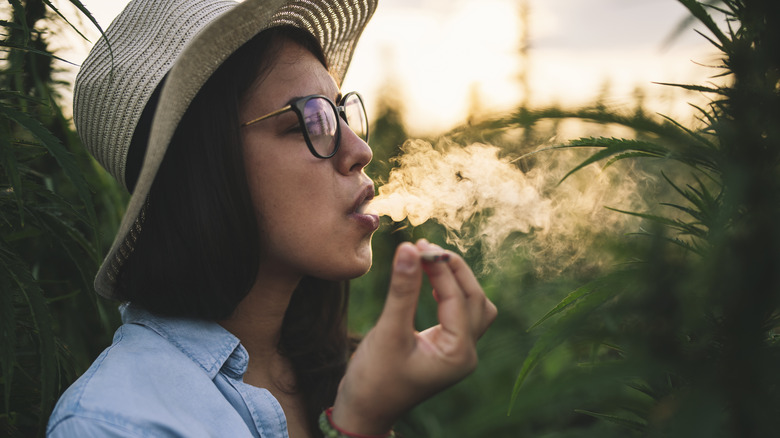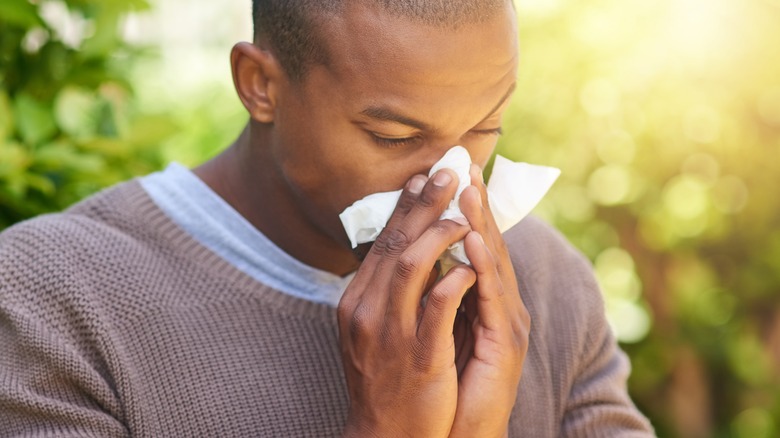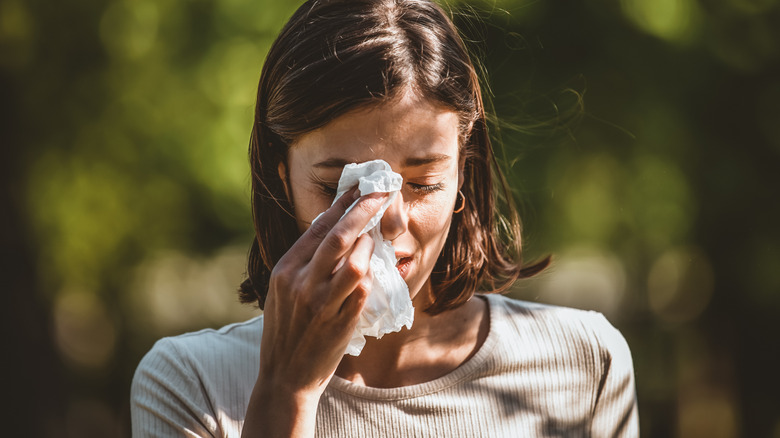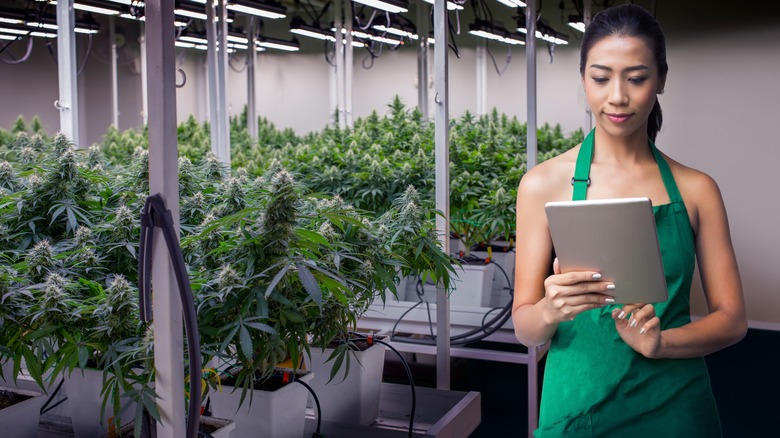Serious Signs That You're Allergic To Marijuana
With more and more states legalizing the use of marijuana in the U.S. and people turning to it as a form of anxiety relief and recreational drug, the daily use of cannabis was higher than ever before in 2022, according to the National Institute on Drug Abuse.
But not a lot of information exists about the allergic reactions to cannabis use or exposure. And yes, you can be allergic to marijuana, just like you can to any other plant or plant product out there, shared Dr. Rachna Patel, an expert in the field of medical cannabis. The allergic reactions can range from mild to moderate or severe to life-threatening. Symptoms of the allergy can vary too, depending on how you were exposed to the substance, per Medical News Today. There could be differences in how you react when you smoke marijuana and how touching cannabis affects your body.
Signs of a marijuana allergy include respiratory symptoms, skin rashes, vomiting, nausea, and dizziness. They can come on instantly or might not start until after an hour or more since you were exposed. Let's take a better look at them.
The symptoms of a marijuana allergy
Signs of a marijuana allergy are very similar to any other kind of allergy, according to Dr. Rachna Patel. "It could include things like sore or itchy throat, stuffy nose, coughing, wheezing, shortness of breath, swelling, red and teary eyes, rash, hives, bronchitis, and asthma," explained the cannabis expert. Contact dermatitis caused by touching weed can manifest in blisters, hives, itchiness, and inflamed skin, per Medical News Today.
If you have asthma, smoking weed or becoming exposed to it in some other way could trigger a flare-up, per Allergy Asthma Network. "Asthma may be related to occupational exposure, while anaphylactic reactions can often occur from hempseed exposure," shared an allergist and professor of medicine at the University of Toronto, Canada, Dr. Gordon L. Sussman (via Forbes). Occupational exposure refers to being exposed to cannabis or any of its properties as a result of your work.
More serious signs of an allergic reaction include anaphylaxis, which is life-threatening. You might find it difficult to breathe and feel dizzy if you're experiencing a severe reaction to cannabis. Other symptoms of anaphylaxis include vomiting, flushed or pale skin, swelling in the mouth and throat, a quickened pulse, and a drop in blood pressure, per Medical News Today.
How does a marijuana allergy happen?
There are a few different ways in which exposure and resulting allergic reactions occur. You can be allergic to smoking or eating the stuff, you might react to cannabis pollen in the air, you may have an allergic reaction to touching weed, or you might be allergic to the mold growing on it and pesticides and solvents used in the cannabis production process. All of this applies to medical marijuana and CBD oil too, per Dr. Patel. While some people might just be allergic to the cannabinoids in marijuana, other common and known allergens in weed include Can s 3 and rubisco.
There are also instances when being allergic to certain protein properties (similar to those found in marijuana) in other foods can increase the likelihood of a cannabis allergic reaction, per Healthline. This is called cross-reactivity. Foods to watch out for include tomatoes, bananas, grapefruit, nuts like almonds and chestnuts, and apples. More potent concentrations of tetrahydrocannabinol (THC) can also cause cannabis sensitivity.
How to deal with a cannabis allergy
Dealing with a marijuana allergy is the same as dealing with any other allergy. At present, there is nothing specific you can do for an allergic reaction resulting from cannabis exposure, including pollen allergy, per Medical News Today. Over-the-counter antihistamines and decongestants or prescription steroids should help with symptoms, but more serious cases may require epinephrine injections.
When it comes to diagnosing the allergy, doctors turn to things like skin prick tests and blood tests. Also called scratch tests, skin prick tests involve introducing some of the potential allergen to the skin and gently pricking its surface with a pin, explained pediatrician Dr. Mugilan Anandarajan (via Top Doctors U.K.).
As with most allergens, removing the trigger can settle things. This means that you should stop smoking marijuana, stop eating it, avoid touching the stuff, and make sure you're not inhaling pollen from cannabis. If you work in a cannabis manufacturing plant, you may have to take time off work to see if that improves your symptoms. Or at least wear protective gear like masks and gloves to mitigate the risks.
There is more that needs to be researched about marijuana allergies
An immunologist at the Allergy and Asthma Network, Dr. Purvi Parikh, told Live Science that it is possible that cannabis allergies were not as widely known before because of the substance being illegal. "Now as the prevalence is increasing, and with the legalization in many states, it is going to become increasingly more common, and all these cases will surface that were not recognized before." The allergens in this recreation and medicinal drug need to be researched a lot more (per the American Academy of Allergy, Asthma, and Immunology).
For those who are trying cannabis for the first time, it's important to educate yourself about the possible risks of using marijuana, one of which is how it might cause allergic reactions. It is also possible that you've never had an allergic reaction before and just developed one over time. At the end of the day, dealing with an allergic reaction is never pleasant. It disrupts your everyday routine at work and home, and even your social life. It might be prudent to tread with caution and be mindful of the effects on your body, some of which can be serious.





